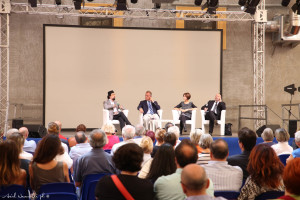Nov 27, 2015 | News
by Josefa Cameron
On November 26th, the Pontifical University Regina Apostolorum and the European University of Rome in collaboration with the UNESCO Chair of Bioethics and Human Rights held the conference “Agricultural development and the fight against hunger. The call of Pope Francis’ encyclical Laudato si’.” The conference hosted a plethora of professors and representatives that spoke on issues concerning agricultural development and the fight to end hunger in reference to Pope Francis’ Encyclical letter, Laudato Si’.
Watch Alberto Garcia’s interview about the event with Telepace below at 16:40-20:00:
“What happens in a small village in Africa can have a ripple effect that reaches Europe and beyond,” said he President of the International Fund for Agricultural Development (IFAD), Kanayo F. Nwanze. He explained that today’s “problems and solutions are not limited by geographic or political boundaries.” Further information regarding his intervention can be read at the IFAD’s website here.
Professor Michael Ryan who spoke on development and decline, expressed the highlights he has taken away from the day’s events, “One thing that stands out to me is the need for all of us to continue working, reading, and investigating more deeply into the richness of Laudato Si’”. Through observing the panel of speaker and their interpretations, Ryan explained that the conference acted as an invitation for him to continue his own study, “the encyclical has a richness that you do not notice the first time you go over it, it is like walking on top of a gold mine, you probably do not realize what is under your feet”.
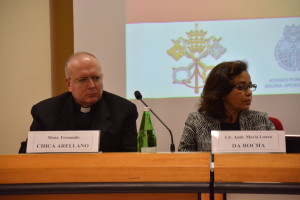
Professor Joseph Tham, Dean of the Faculty of Bioethics, discussed the topic of technoscience, technoethics, and technocracy. Through his interpretation of Laudato Si’, Tham suggested that the main message of the encyclical involves, “the question of technology and the problems that arise due to it. We live in a very technological society, we can forget that we are part of something bigger, that we are creatures and that technologies are a means to help us live more comfortable lives. However, technology can also damage us, damage society, and damage the environment.”
Regarding what subjects hoisted interest for further investigation, Tham found interest in the subject of ecological conversion, “somehow we need to change our mentality and to recognize that we cannot continue exploiting and manipulating nature as if it were disposable”. Tham pointed out that, “The call for this conversion is to appreciate that we are related in some way, it is an interelationality between God, nature, and man.”
Tham also took particular notice on the discourse of power that was considered during the panel, “we all want some element of power and to be able to control our surroundings. In a way, this is a cause of the problem because the desire for power leads to conflict.” Through this desire to control our environment, solutions regarding its wellbeing are overlooked and we ultimately damage it and ourselves. Pope Francis’ Laudato Si’ can be deemed as a response to this environmental dilemma caused by human recklessness. Tham noted that, “We need to analyze what is true power. I, personally, think true power is to be humble and to respect our environment.”
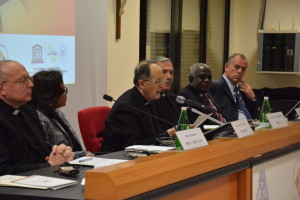
Nov 19, 2015 | News
UNESCO Chair Director Alberto García signed a framework agreement for ongoing collaboration with the Universidad Finis Terrae in Santiago, Chile on November 19, 2015.
The accord was signed the same day García spoke delivered the introductory address of an interdisciplinary conference on “The reception of the encyclical Laudato Si’ from an ecological, philosophical, and irreligious perspective.” A full schedule of the participants can be found at the end of this article. The following is an interview with García regarding the importance of the event.
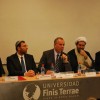
What benefits will bring to the University perform this type of collaboration agreements?
The agreement we have signed today a memorandum of understanding or a letter of intent to start a direct and immediate link on projects in education, research and dissemination of knowledge in bioethics, in light of human rights based on what we share all human beings irrespective of our culture, our religion or our scientific or technological background. Through the UNESCO Chair and the University Finis Terrae, we will engage primarily in four areas of interest always looking for the art of convergence and cooperation in the field of global ethics: Neureobioethics; Bioethics, Multiculturalism and Religion; Bioethics and Global Art, which will imply the participation of the Universidad Finis Terrae in an international Bioethics Art Competition (www.bioethicsart.org), that inspires artists to produce works of art with values that respect human dignity and fundamental rights and duties of individuals. Finally, Bioethics and Human Ecology, which is precisely the issue that brought us to this seminar today.
What is the importance of such meetings?
The fundamental importance is that with emerging problems we have in Chile and around the world, it is important to call people with different professional expertise in different branches of knowledge (scientists, theologians, philosophers, jurists, sociologists, etc.) to engage in a constructive reflection on an event, such as the encyclical of Pope Francisco. To the extent that we encourage such meetings, in an atmosphere of diversity and with people like those who have participated in today’s event, we will be able to propose solutions that will be more effective, more democratic, and better for the common good.
Did you think that it would generate a large gathering?
I knew the Universidad Finis Terrae from a distance and knew that it had the ability to host great gatherings. However, I really was surprised by the variety of people who came, their different backgrounds, people of different philosophical and intellectual areas of high caliber and people who are committed to caring for the environment. I think that such a gathering reflects the true capacity of irradiation the university has in today’s society.
Do you think there will be any change in the perspectives of the audience?
Certainly, but not only through what was said. The symposium, which I think was very interesting, was extremely enriching thanks to other speaks and to the questions and comments from the public. First, I think people will leave this activity and will read the Laudato Si’ encyclical itself, which is very important. Second, it shows that you can be interested in the social thought of the Catholic Church, which is enormously rich for believers and nonbelievers. Third, it will awaken in each small commitments in their own families or in their work environments.
In line with its constant commitment to bioethics, multiculturalism, and interreligious dialogue, the Chair is preparing a similar gathering of diverse thinkers to discuss the same Papal document from various disciplinary and cultural perspectives on November 26 in Rome. The Rome gathering will focus on collaboration among various cultures and religions in the fight against hunger and will feature the presence of representatives the Permanent Observer Mission of the Holy See to the United Nations. To read more about the “Agricultural development and the fight against hunger” event, click here.
Click the image below to see a full list of the participants.
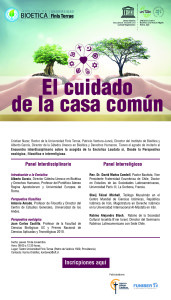
Oct 15, 2015 | News
by Michael Baggot
In a recent Huffington Post blog entry, the Wexner Scholar at Rabbi Isaac Elchanan Theological Seminary Mark Weingarten recounts his experience at the summer course on Human Ecology co-sponsored by the Chair. Despite his cultural, religious, and age differences from many of the course’s participants, the young rabbinical student quickly found it easy to dialogue with his companions on the importance of promoting the vision of human ecology articulated in the Pope’s most recent encyclical Laudato Si’. For instance, he found in an England priest devoted to child protection and foster care a distinctly dressed companion in the common quest to create a more humane society open to the positive influence of faith in a world often characterized by individualism and skepticism.
Regina Apostolorum’s shared commitment to intellectual charity finds a uniquely multicultural and inter-religious dimension in the UNESCO Chair, which has facilitated since its 2009 foundation enriching encounters akin to Weingarten’s brief summer experience. Jointed hosted by the Bioethics faculty of Reginia Apostolorum and the Law faculty of the European University of Rome, the Chair dedicates intellectual resources to creating constructive dialogue on society’s most pressing issues among peoples of all backgrounds in order to contribute to a civilization of justice and love. The Chair seeks to create a forum of diverse bioethics thought leaders. Collaborating in a spirit of respect and friendship, it hopes to deliver a common framework to guide the application of bioethical principles in the light of the UNESCO Declaration. In this manner, it can inform and enlighten ethical, legal and public opinions, decisions and actions relative to medicine, life sciences, and human rights and responsibilities.
The intellectual charity at the root of the institute’s spirit of respect and friendship in collaborative work has found concrete expression in a series of international workshops on Bioethics, Multiculturalism, and Religion. In Jerusalem, Rome, Hong Kong, and Mexico scholars from seven faith traditions have gathered to analyze key bioethical themes. The intellectual charity driving these events has overcome all conflict between the apparently warring values of rigorous academic research and warm familial relations. Since the days include not only the presentation of prepared papers, but also ample time allotted to the open discussion of these works, there is a lively interchange that could easily degenerate into combative chaos without the exercise of virtue. Thanks to the intellectual charity that reigns, participants have spent the past years growing in mutual understanding and appreciation for their respective faith traditions, while also enjoying the confidence to challenge their companions to an ever more profound comprehension of the truth toward which all participants strive as companions. The sometimes fiery debates that ensue after certain presentations enable the speakers to revise their work before the final papers are published together by the prestigious company Springer. Again, when participants identify disagreements inevitable among such a culturally and religiously diverse body, they always do so with the utmost respect toward their fellow scholar and friend.
Further evidence of the force of this intellectual charity is in the informal exchanges that continue during the year. It is not uncommon for a professor of Buddhism in Hong Kong to email a Catholic priest question regarding the Magisterium’s view on a recent medical development. Nor is it uncommon for a Catholic lawyer from Spain to contact an expert in Hinduism in Houston regarding collaboration on an article. Intellectual charity sustains these relationships across the globe and strengthens the humility that enables individuals of differing worldviews to learn from each other and grow in the common quest for truth. Thus, the Chair’s international mission of “fostering the art of convergence and cooperation in global ethics” remains one of the university’s manifold manners of living its commitment to intellectual charity.
Oct 4, 2015 | News
by Gianfranco Bellissimo
translated by Michael Baggot
The international conference “Man, Society, and Peace” organized by the association “Human Rights for Life, Justice, and Peace,” with the collaboration of the university Regina Apostolorum the UNESCO Chair in Bioethics and Human Rights, was held October 3, 2015 in the city of Monaco.
The day, which was held in the headquarters of the Oceanographic Museum of the city and under the patronage of SA.S. the Sovereign Prince Albert II of Mónaco, is a initiative that aims to “extend peace and respect for human dignity, starting from Monaco.” Significant scientific, social, political, and ecclesiastical speakers included:
- S.E. Mr. Michel Roger (Minister of State of Monaco)
- Ms. Isabelle Bonnal (Director of Education of Monaco)
- S.E. Msgr. Bernard Barsi (Archbishop of Monaco)
- Dr. Alexandra Henrion-Caude (Director of Research in INSERM, France)
- Prof. Evandro Agazzi (President of the International Academy of Philosoph, Switzerland)
- Prof. Don Briel (University of St. Thomas, United States)
- Prof. Paola Bernardini (University of Notre Dame, USA)
- Msgr. Bernard Munono (Pontifical Council of Justice and Peace)
The meeting was organized in four round tables discussions, which were moderated by two professors of the Faculty of Bioethics: Fr. Gonzalo Miranda, LC (Professor of the Faculty) and Prof. Alberto García (Director of the UNESCO Chair in Bioethics and Human Rights). The conversation between the various speakers sought to answer, in each of the round tables, four basic questions: 1) What does science says about man? 2) How should we educate others in knowledge, conscience, and responsibility? 3) How can policy be a service to humanity? 4) What is the contribution which religions can make to the cause of peace in a multicultural world?
“We are all responsible for promoting dialogue and peace; but there are a few social moments that can and must have a special protaginism. These include the four considered during the meeting: science, the university, politics and religion,” said Miranda.
“The Principality of Monaco is a political and social reality especially significant in spreading the message that the conference wants to convey: it has always lived a kind of vocation to dialogue and acceptance, coming from its very identity,” continued Miranda.
“Our globalized world needs men and women with competence and virtue act for dialogue between different cultures and the different branches of knowledge. Creative people are able to find convergence in the ideas, talent and resources that are linked to the common good and work with dedication, optimism and mutual respect for one another and for diversity. There is no person, community or cultural tradition which cannot contribute in any way to the construction of our society, sometimes crushed or disappointed. Now is the time of transcendence, to go out of ourselves and seek the other, the others. Today is the time to make a commitment of solidarity in favor of others, not of nostalgia and sterile complaints,” commented García.
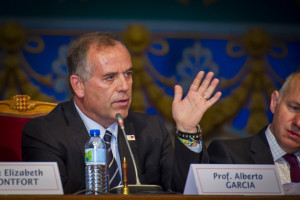
Sep 23, 2015 | News
by Michael Baggot
UNESCO Chair Director Alberto Garcia joined representatives of monotheistic religions for “the lunch of delight” during the International Festival of Hebraic Literature and Culture on September 6, 2015. Espresso journalist Lara Crinò guided the dialogue between Garcia, rabbi Roberto Colombo and iman Yahya Pallavicini on eating as a moment of encounter.
The round table discussion was divided into five parts. First, the participants reflected on food as a fundamental right. In particular, they analyzed their shared support for call for all governments to ensure the access to food and water found in article 14 of the UNESCO Universal Declaration of Bioethics and Human Rights.
Second, the participants looked at how food can become a place of relationship in a wide range of religious and cultural traditions. They noted that man does not eat simply to fulfill a biological instinct, but transform such needs into an occasion for building community in an openness to the richness of the other.
Third, the experts noted that feasting entails both joy and remembrance. Traditionally, the family meal is a moment of respite after a long day of study and work in which each member can recall, celebrate, and share the blessings of the preceding activities. The dimension of remembrance is especially present in those homes that host multiple generations under the same roof.
Fourth, the dialogue partners recalled the special importance that Jesus, deeply rooted in his Jewish tradition, ascribed to meals in his life and ministry. In the choice to begin his long-awaited public ministry, in his frequent controversial dinning with sinners, and in his Easter meals shared with his surprised and overjoyed apostles, Jesus frequently utilized food to transmit the most sublime of messages.
Finally, Garcia highlighted how the Catholic tradition has given special significance to food and nutrition in its long tradition of Eucharistic piety. We could say that his last will and testament was that his followers should relive the experience of the Last Supper throughout the ages. It should thus not be surprising that the same faith tradition looks forward to a heavenly banquet as the definitive satisfaction of man’s every authentic hope and desire.
An extensive broadcast summary of the week’s events can be viewed on the renowned Italian channel Rai here.
